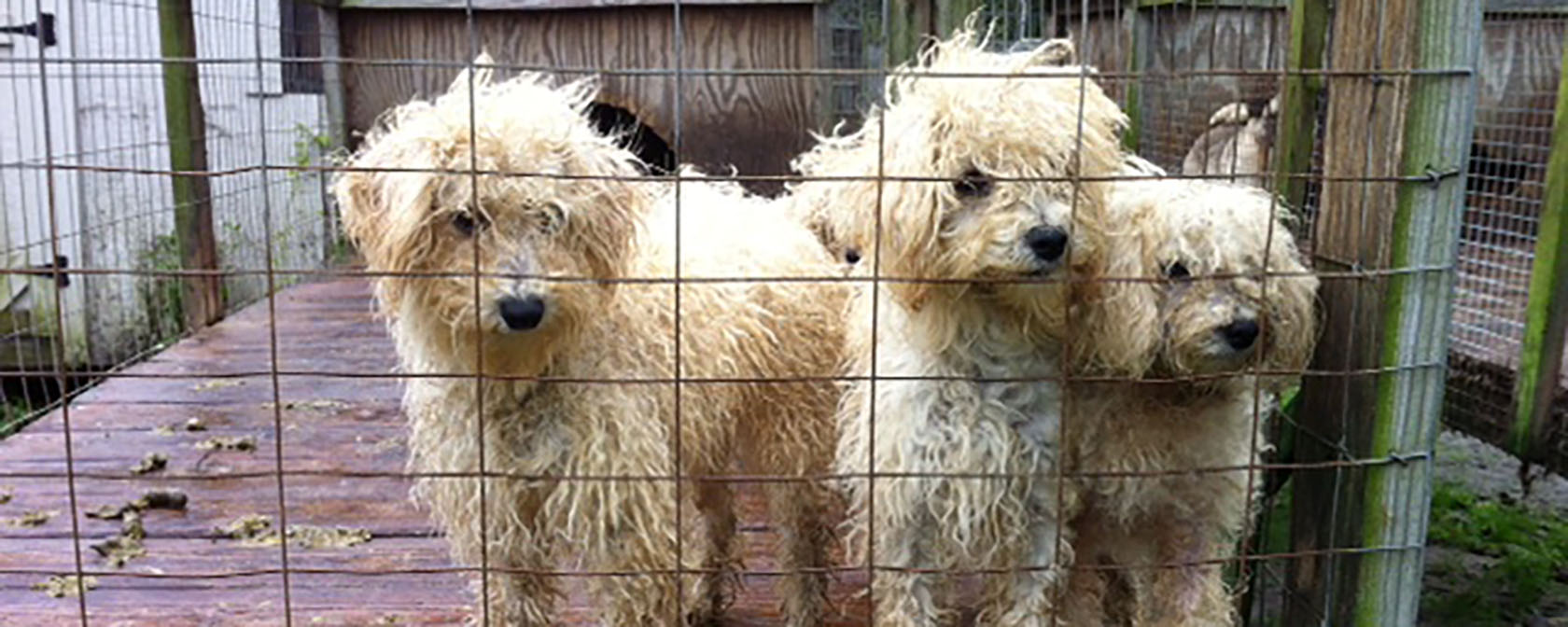By Sara Amundson and Kitty Block
Right now, in the U.S. Congress, the American Kennel Club is targeting two good bills that have strong bipartisan support: the Better Collaboration, Accountability, and Regulatory Enforcement (CARE) for Animals Act and the Puppy Protection Act.
The AKC has proven time and again that local, state and federal legislation to protect animals is not in its purview—the organization will even go out of its way to kill it. Our commonsense policy approaches should not be mischaracterized by an entity that only exists to increase the numbers of purebred puppies sold to consumers, often at a cost to the animals' welfare. Let’s set the record straight about the AKC’s recent op-ed in the Washington Times right up front:
- The AKC contends that the Better CARE for Animals Act would circumvent oversight authority by the U.S. Department of Agriculture. It wouldn’t, since the measure does not transfer any of the USDA’s authority or responsibilities to the DOJ. All federal licensing and inspection of facilities regulated under the Animal Welfare Act would remain with the USDA.
- The AKC suggests that the USDA is well-staffed at present and “hugely effective.” But the repeated violations discovered at breeding facilities, including those with ties to the AKC, suggest that too many animals are still suffering under the USDA’s watch. The USDA has recently undergone some significant attrition and firings in recent months, which could further allow countless puppy mills, as well as roadside zoos and other facilities regulated under the Animal Welfare Act, to continue business without as much oversight.
- The AKC claims that the bill creates an entirely new bureaucracy in the U.S. Department of Justice. It doesn’t: The DOJ already has some enforcement powers to address animal welfare problems. This is an authority that the DOJ has used sparingly and judiciously, most notably in the Envigo beagles case in 2022. In fact, the DOJ has had the authority to seek injunctions in Animal Welfare Act cases pertaining to animals in danger since 1990. It first used that authority under the Trump administration in 2020 in the case of big cat exhibitor Jeffrey Lowe (Tiger King, LLC) who had chronic Animal Welfare Act and Endangered Species Act violations.
- The AKC insists that an already existing memorandum of understanding between the USDA and the DOJ agencies is enough. But such agreements can be swept away on a whim or by a pen stroke during changes in administrations; a law cannot. The Better CARE for Animals Act would ensure that information and evidence sharing between the two agencies can facilitate the DOJ’s bringing civil cases for serious and repeated violations of the Animal Welfare Act. It is our hope that such a law could allow for earlier interventions and prevent animal suffering on the scale we saw in the case of the Envigo beagles.
The AKC peddles many falsehoods about such measures, because it cannot tell the truth about itself. The AKC is not in any meaningful sense a friend to animals. The AKC mainly functions as a registry for purebred dogs in the U.S. and a promoter of events for purebred dogs. It’s an ally of mass-production puppy mills, and it profits well from its registrations and certifications. The AKC makes tens of millions of dollars per year issuing pedigree registrations used by the puppy mill industry to paper over its cruelties and its exploitation of those who buy mass-produced puppies.
Help protect dogs in puppy mills by advocating for the Better CARE for Animals Act >>
When the AKC wades into state and federal policy debates involving animals, it is typically there to obstruct or throttle good laws that protect animals. Laws championed by Democrats, Republicans and Independents. Laws welcomed by regulatory and enforcement agencies. Laws that meet the tests of common sense and common decency. It’s almost as if the AKC’s opposition shows how good these measures are.
Since 2008, by our estimate, the AKC has opposed more than 500 animal protection measures at the state and federal levels. The AKC’s misguided agenda includes opposing bills to ban surgical debarking of dogs and other commonsense measures, such as bills requiring that dogs have continual access to drinking water. No wonder it opposes the implementation of stronger protections and enforcement at puppy mills and other regulated commercial facilities.
The AKC’s actual standards are dangerous for dogs because they prioritize appearance over health. This only promises to reinforce the presence of serious genetic malformation in dogs and let irresponsible breeding operations carry on their business with a veneer of legitimacy achieved through AKC paperwork.
Year after year, our Horrible Hundred reports about bad breeders across the U.S. reveal the AKC’s ties to puppy mills. In 2025 alone, one-third of the bad breeders listed in our Horrible Hundred report had links to the AKC.
It is because of the indifference of the AKC and other parties to the most basic standards of animal welfare at puppy mills that we have championed the Puppy Protection Act. Its provisions are reasonable and are intended to remediate long-standing deficiencies in the Animal Welfare Act that we, USDA officials, members of Congress, the national media and the public have all observed or experienced. But rather than own up to the problem and support reform, the AKC sounds the dog whistle in shrill and misleading communications enlisting its members in attempts to destroy legislation that would help dogs in puppy mills and other facilities regulated under the Animal Welfare Act. These animals are entirely at the mercy of operators and thus dependent on the passage and enforcement of good laws.
Voice your support for the Puppy Protection Act >>
If we had not seen the AKC’s efforts to take away even the faintest prospect of improved lives for dogs again and again over the course of decades, such bad faith would be truly shocking.
If you know anything about puppy mills, you know that there isn’t a more devalued currency on earth than an AKC registration. And there’s certainly no reason to assign value to the AKC’s views on animal protection legislation at any level of government.
Kitty Block is CEO and president of Humane World for Animals.




